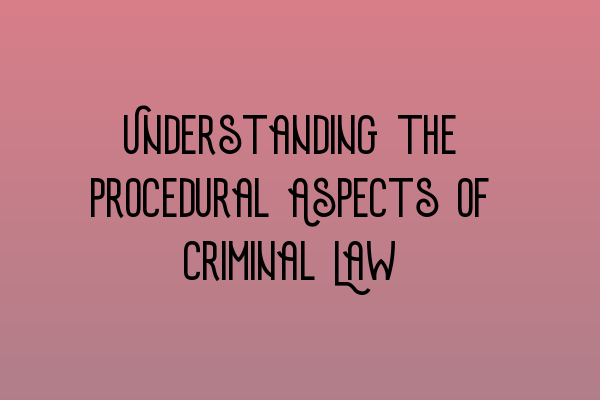Understanding the Procedural Aspects of Criminal Law
At SQE Criminal Law & Practice Law UK, we understand the importance of comprehending the procedural aspects of criminal law. As criminal solicitors, it is vital that we have a firm grasp of the procedures involved in handling criminal cases to ensure the best possible outcomes for our clients. In this blog post, we will delve into the key procedural aspects of criminal law, shedding light on their significance in the criminal justice system.
1. Arrest and Detention
In criminal cases, the first procedural step is often the arrest and detention of a suspect. This occurs when there is reasonable suspicion that an individual has committed a criminal offence. For a detailed understanding of the arrest and detention process, you can refer to our related article on SQE 1 Practice Exam Questions.
2. Charging and Bail
Once a suspect is arrested, the next procedural aspect is charging and bail. This involves formally accusing the individual of committing an offence and determining whether they should be granted bail or held in custody until their trial. It is crucial for criminal solicitors to be well-versed in the criteria for granting and opposing bail. To enhance your knowledge on this topic, we recommend reading our article on SQE 1 Practice Mocks FLK1 FLK2, which provides valuable insights into the bail process.
3. Disclosure and Evidence
Disclosure and evidence play a pivotal role in criminal proceedings. The prosecution is legally required to disclose all relevant evidence to the defense, ensuring a fair trial. As criminal solicitors, it is our duty to carefully analyze the disclosed evidence, identify any discrepancies, and effectively challenge the prosecution’s case. To gain a deeper understanding of the importance of disclosure and evidence, we offer comprehensive SQE 2 Preparation Courses that cover this topic in detail.
4. Trial Preparation
Before a criminal trial takes place, meticulous preparation is necessary. This includes gathering relevant evidence, interviewing witnesses, and constructing a strong defense strategy. Our SQE 1 Preparation Courses can provide you with the knowledge and skills required for effective trial preparation. To ensure you are up to date with the latest SRA SQE Exam Dates, be sure to check out our related article.
5. Court Proceedings
Court proceedings involve various stages, such as opening statements, witness examination, cross-examination, and closing arguments. Familiarizing yourself with the procedures and etiquettes of court proceedings is essential to represent your clients effectively. At SQE Criminal Law & Practice Law UK, we offer comprehensive resources, including SQE 1 Practice Exam Questions and SQE 1 Practice Mocks FLK1 FLK2, to help you develop expertise in this area.
In conclusion, the procedural aspects of criminal law are crucial for criminal solicitors to ensure the best possible outcomes for their clients. Understanding the procedural intricacies, such as arrest and detention, charging and bail, disclosure and evidence, trial preparation, and court proceedings, is fundamental in delivering effective legal representation.
If you are pursuing a career in criminal law, we encourage you to explore our SQE 2 Preparation Courses and SQE 1 Preparation Courses. By developing a deep understanding of the procedural aspects of criminal law, you will be better equipped to navigate the criminal justice system and provide exceptional legal representation to your clients.
For more information and resources, visit SQE Criminal Law & Practice Law UK.
